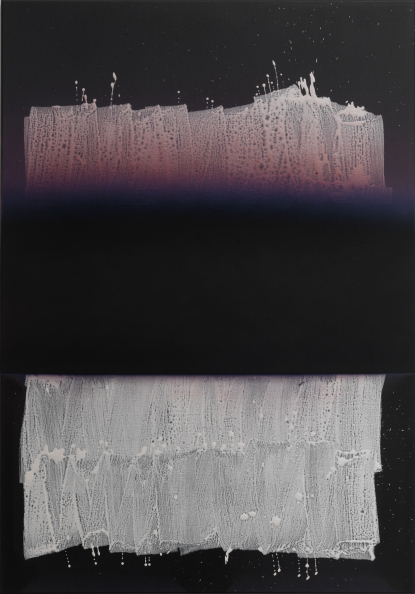
Nathan Hyland
“The element of truth behind all this, which people are so ready to disavow, is that men are not gentle creatures who want to be loved, and who at most can defend themselves if they are attacked. They are, on the contrary, creatures among whose instinctual endowments is to be reckoned a powerful share of aggressiveness. As a result, their neighbour is for them not only a potential helper or sexual object, but also someone who tempts them to satisfy their aggressiveness on him, to exploit his capacity for work without compensation, to use him sexually without his consent, to seize his possessions, to humiliate him, to cause him pain, to torture and kill him. Homo homini lupus.”
Sigmund Freud
“For Freud, all social relations, private and public alike, share a hidden Oedipal typicality which underlies their various manifestations.”
Jose Brunner
“A phantom among men; companionless
As the last cloud of an expiring storm
Whose thunder is its knell; he, as I guess,
Had gazed on Nature’s naked lovliness,
Actaeon like, and now he fled astray
With feeble steps o’er the world’s wilderness,
And his own thoughts, along that rugged way,
Pursued, like raging hounds, their father and their prey.”
Shelley
“Adonais”
I suspect that the most virulent anti-Freudian rhetoric and opinion comes these days from younger white men. It seems not to matter much if their political position is to the left or right. This links to the over-all general sense I have of white panic having been dialed up a couple notches recently.
What are the implications for the reality that this month’s protests over Police murders is being driven largely by women of color, but more, by queer black women. Not entirely, certainly, but largely I think. There is a lot to unpack in this vis a vis gay white man culture, mainstream media, the Oedipul narrative (accepted or not) and in a sense of where aggression comes from in society. Stan Goff has written a good deal on white men and guns. I keep coming back to the sense I have these days of white male sickness.
But let me backtrack here. The logic of Oedipal theory foregrounds a primary anxiety born of that recognition in the infant that mother’s breast is not completely under his or her control. Is it correct that the infant’s next response is to want to devour the breast? To control through incorporation, bodily incorporation? This is, needless to say, a contested area in psychoanalysis. Is the breast separate from the mother? Is there an identity attached to the source of food, and pleasure? Is this impulse in the infant toward control? Is this is primary sort of ur-control instinct, or response? There are countless X-factors in theorizing about the inner life of infants. Melanie Klein, Winnicott, Jung even, and on through to Lacan.
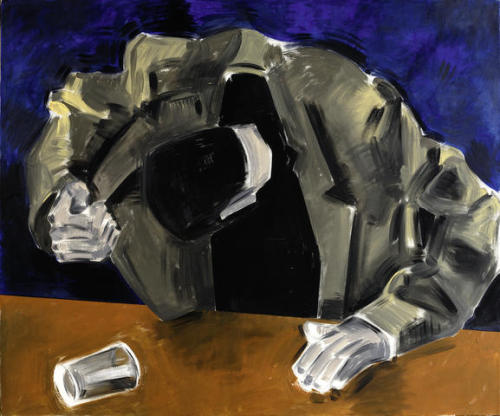
Apostolos Georgiou
Jose Brunner wrote: “the child’s recognition of the parents’ control over his needs and wishes also turns a possible loss of their love into a dreaded prospect. Since children fear to lose their parents’ love and the concomitant feeling of safety, the parents can, by granting or refusing affection at will, deploy their love as an instrument of domination and control.”
The need to be loved means what? For this seems to me a different thing than what the infant feels toward the breast, or later toward the source of that food and pleasure. The mother is loved, but that is not the same as saying (I don’t think, anyway) that we want to be loved throughout our lives. Yes, we want to be loved throughout our lives, and that is probably an expression of this very early imprint and association. And even if one accepts the Oedipal thinking in this, there is still a question of what we mean by *love* when it is spoken to the object of one’s love, or to anyone, really, once we are adults. For the infant, the dependency on both parents, and/or adults, becomes intimately linked with authority. And this is the (or one of) the crucial issues here. And perhaps it is *the* crucial issue. The child, as it gets slightly older finds its desire coalescing around an identification. The boy wants to be like the father, the girl like the mother. Just how gendered this identification is remains an interesting question. Meaning, does the boy or girl tend toward more identification or less, and are there qualitative differences in the fabric of these identifications for each gender.

Anton Henning
The most contested area of the Oedipal narrative circles around what Freud called the *phallic stage*. For Freud, this meant all desire was for the mother. There was having a phallus or there was castration. I think it is relatively safe to say there are problems with this. Although they may not be quite what mainstream thinking believes. But I want to look at this question of love, more, and what is meant by desire and how this evolves in the child. The punishing father is a social construct. The desire for the mother is mixed in with trace elements built upon food and pleasure and safety. The punishing father is the force of restriction.
The idea of *love* is connected with sex. And then with an entire history of institutions built around property, women as property, virginity, disease, law, and probably, too, with immortality. But by adulthood the child has grown, physically matured, and introjected the authority of the Father, and in so doing formed what Freud called the super-ego. This is a complex topic, and no small reason for this complexity has to do with the qualities of authority that are taken in by the child to form this internal police force. Or court of the self. The fact is that the most authoritarian and physically brutish father can be a far less guilt producing parent than Mister Rogers or casper milktoast. In fact, the expression of power and domination is not necessarily the means to the most sadistic offspring. And this has to do with the myriad other ways the child’s ego is formed by society. At the age of five or so, according to Freud, the child’s sexual/erotic urges are sealed like court documents, and the conscious mind ‘forgets’ them. The erotic anxiety of identification (which includes both the desire to be like the father, but the understanding that one cannot be identical, nor is one allowed to do all the exact same things the father does). Now, once this material is repressed, the court documents hidden away, a host of other questions are introduced. And this is more what concerns me here.
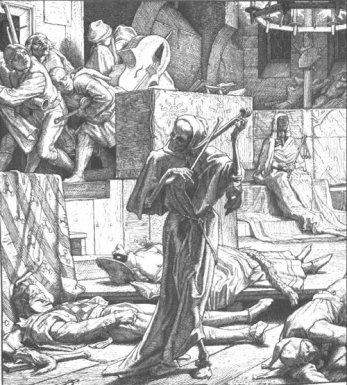
Alfred Rethel, engraver. 1851. “Death as a Cutthroat” based on cholera outbreak in Paris during festival.
The child has learned that desire is to be regulated. If authority looms as an antagonist to desire, then authority wins, but only by the incorporating of that authority into the subject, thereby, in a sense, conquering desire. This clearly is something less than efficient and produces all the many psychological maladies of modern existence. There is another issue hovering here, and that is the new father of the 21st century west is mediated by factors previous fathers were not. Or not as acutely. The father of my generation is one who grew up himself in a world without telephones, even. My son’s generation had fathers such as myself who grew up and reached adulthood before the computer was widely used. Before any digital technology. The classical bourgeois Father, authoritarian and punitive has been replaced, in the bourgeois West, by a far more passive/aggressive father. One who himself developed a more disfigured relationship to desire, and I suspect who has a less decisive repressive mechanism. In other words those court documents are less effectively sealed. But this might well be the exact opposite. For both might produce what I perceive today as the less authoritarian father, but the more sadistic and ‘affectless’ father.
This is a dissection of white male consciousness. Now, however much wants to accept or renounce Freud’s theories on the Oedipul narrative, there is a real question I think that resides in what I see as a sickness of white society, today. The very regressive ideas of conventional marriage and family are coupled to, at least in the U.S., an internalized patricide, resulting in an internalized acceptance of rules and order. In my experience I know very few men who escape the Oedipal implications of their relationship with the father. The last few generations, however, seem to have a less direct link to the Oedipal, or a more mediated one anyway, and their relationship to authority seems more influenced by a screen life of substitute authorities. That social change may now come from communities in which the traditional family structure is weighted more to the side of the Mother should probably not be surprising (although it is the function dynamic that matters, but more on that later). This is one of the motivations in the intensified demonizing of black and latino culture today, at the hands of white centered culture. White men in the U.S. today are fueled by an additional layer of resentment, and this seems to cut across all political divides, if not quite class divides. I think on a personal level I’ve never particularly felt part of white society. I have felt, if anything, a betrayal by white society. And this is where, perhaps, class resentments enter the discussion.
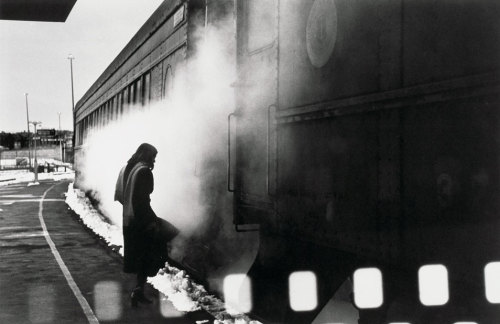
Charless Harbutt, photography.
Freud saw the pleasure principle as transforming to the reality principle.
“The animal man becomes a human being only through a fundamental transformation of his nature, affecting not only the instinctual aims but also the instinctual “values” — that is, the principles that govern the attainment of the aims.”
Herbert Marcuse
The submission to authority is reproduced socially at all levels. In other words, phylogenetically, the Father is replaced by the sons as part of a clan, which has become various institutions of authority. The earliest is probably school. The primary experience of early schooling in the U.S. is submission to rules. The Principle is the Father. All institutional authority is social domination. The individual growing up under social domination will pass that domination on to the next generation. But this is never complete. The return of the repressed is where cultural expression finds importance. Hence, Adorno’s belief in the artwork writing the unconscious history of mankind. As Marcuse noted, “The struggle against freedom reproduces itself in the psyche of man, as the self-repression of the repressed individual, and his self-repression in turn sustains his masters and their institutions.”But there is something occuring in 21st century society that seems an almost de-linking of the Oedipal narrative from later renunciations. The Father is now ‘only’ a symbol, and perhaps this part was always partly true, and a screen authority — in other words the cycle of enslavement and rebellion is mediated by the post modern order of domination, the structures of which are now so abstract and in which the individual so amnesiac, that the screen world of mass culture in the West has created a revisionist interior form. If Marcuse saw reason as a potential liberating force, what has happened is that unreason, the irrationality of modern wage drudgery, is almost an erasing of this primordial cycle. Marcuse saw a repressive modification of happiness. I think this was probably a great understatement, in fact. For the loss of memory has meant a loss of the abilities for inner life containing an emancipatory aspect. The practice of psychoanalysis has shifted toward an adjustment therapy, and this has meant a de-emphasizing of deep memory. Just make your life efficient. Adjust, conform, for happiness is conformity without those unpleasant eruptions of internal contradiction. Of course this really means a doubling down on the repressing of contradiction.
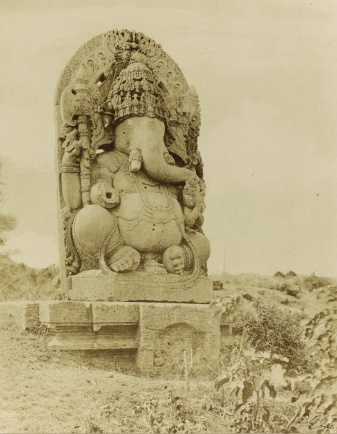
Linnaeus Tripe, photography. South India, late 19th century.
As Marcuse noted again, today the union of servitude and freedom has come to seem natural. Except that freedom is the deformed version of freedom to shop, freedom to conform within a very narrow set of parameters. There is in Freud a clear masculine bias, as Jose Brunner writes: “Moreover, the oedipal vision exhibits a distinct patriarchal bias, it reduces politics to an activity of fathers and sons, while relegating women to the role of passive objects of male desire.” And this is an underlying expression of the Post Ferguson movement today. It is gendered and it is racialized and it is class mediated. The ruthless hegemony of an instrumental logic, and the equally ruthless organization of institutional domination by a ruling class, a white male class in its essence, has meant that any dissent from within this status quo doesn’t even need demonizing for its appearance is automatically perceived as irrational and immature. This logic operates on a very deep level, at the core of psychic formation, and it extends to the very earliest social structures into which the child is thrown. The Spectacle now declares, over and over, the desire for peace, for equality, for a better environment, all the while working ceaselessly to enforce its opposite. In truth, there is a war against aesthetic discrimination today, for all aesthetic concerns are treated much like dissent, finally. As the society becomes ever more infantile, the public is encouraged to reject maturity as conformist. This is a core contradiction actually. The Ferguson protests operate at two levels, perhaps three. For the black community it is a means toward social change. For the affluent liberal class it is spectacle, and part of a manufacturing process of self and conscience, and has no real point beyond that. For the media it is an unruly child acting out.
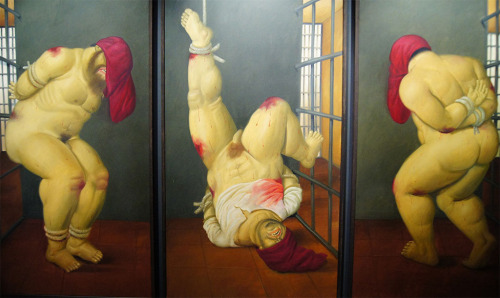
Fernando Botero
But I want to go back to this notion of love. In the advanced West, meaning the U.S. but also much of Europe, there is a decided emphasis on individuality. Love is then an individual experience. The repressed adult is relating to a sexuality that is divorced from those impulses for gratification that the infant felt. This is an individual fetishistic and objectifying sexuality. It is sexual conquest, and it is uncoupled completely from community and Nature. The erotic is genital, and it is aggressive. Increasingly in the U.S. this is not even a gendered issue. Gratification is reified. Reich, Marcuse and others, Norman O. Brown, Ernest Becker, over fifty years ago, recognized that sexual sickness was being promoted as sexual freedom. As long as it stayed an individual skill, a scorecard, then it would not only be tolerated but marketed. The fact that a term such as *Trophy Wife* could even come into existence says a lot all by itself. The infant’s desire to control the breast, to understand the relationship with this source of nourishment, health, and pleasure was fraught with anxiety, and when that threshold seemed to occur around the age of five, the residue left to the child was mostly to do with anxiety. Desire was already alienated desire. That sexual urge became disconnected with reciprocity was no doubt the result of the avenues taken by repression. And this is what I think needs a re-thinking perhaps. Contemporary desire, for men anyway, is deeply attached to aggression, and to institutional authority. That may seem reductive or distorted or simplistic, and perhaps it is all three in some ways, but the anal sadistic spectacle described in the Torture Report suggests that I’m not totally mistaken. The torture report only solidifies what many already knew. There is a marked lack of remorse or doubt in the affluent classes with regard to the report. There is no teeth gnashing or hang wringing, or grief. There is barely suppressed satisfaction in Western power and its ability to dominate inferior races and culture.
“Nature does not know real pleasure, but only satisfaction of want. All pleasure is societal- in the unsublimated no less than
in the sublimated impulses. Pleasure originates in alienation.”
Adorno

Spencer Murphy, photography. From “Architects of War”, arms trade show.
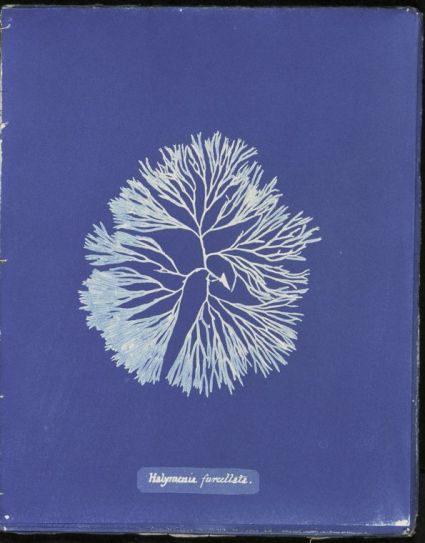
Anna Atkins. “Cyanotypes of British Algae.
Throughout Greek tragedy there is recurring declaration of war as horror. In Shakespeare the horror drives individuals mad. The madness, though, speaks to the irrational in the individuals makeup. It stimulates a latent potential. The character of humanness is madness, and it is always a fight — thee fight– to stave off the looming insanity, and the insanity cannot be seen, or rather, cannot be recognized. In Shakespeare the failure of recognition runs throughout his work. In the best film noir, the narrative hangs on coincidence, on disguise, on paranoia. There is perhaps but one plot; a stranger enters.
We are strangers to ourselves, that was Freud’s message.
We are also all potentially mad. Delusional. The psychosis of the white ruling class, today, is one with the loss of deep memory. Without memory, it can be postulated, one cannot love. To unseal the sealed documents of childhood gratification, but also of rivalry and anxiety and symbolic cannibalism, must be the goal of the journey of maturation. There is, however, something very else in this discussion; and really, it is two things, but they overlap. One is the *way* we remember. The narratives we construct. And the second thing, and another area critics of Freud like to attack, and that is the Death Instinct.
Nietzsche was the thinker who most emphasized the corrupting aspect of the wrong kind of memory. What Marcuse noted, as well; that we remember duty and obligation, but not pleasure. However, this raises a question about the electronic mass culture today, where the remembering of obligation becomes, itself, eroticized. Or at least it is facsimile erotic. It is sexy to pick up the dry cleaning or get the groceries. The public is trained in a titillation of false memory, for that is partly what marketing does. I have always found the ‘recovered memories’ story, the travesty of justice and tragedy that resulted from the narrative of child molestation, the witch hunts that followed, to be of great symbolic importance. The American pre school child as victim. But also as confidant of the DA. A child adrift, unprotected, in a sea of predators was also starting to seem like an informant. There was something of a Cotton Mather feeling to this whole affair, a projection of that deep guilt of severe repression, both psychically and physically. McMartin Pre School as the cost of preventing children of earlier generations from masturbating.
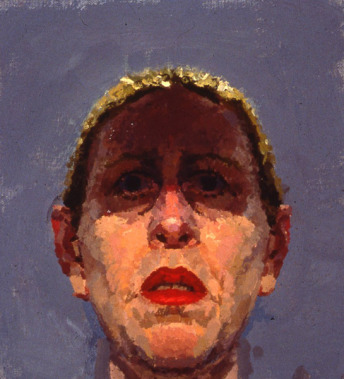
Susanna Coffey
The mass culture of today is one in which on a deeper level, the soul sickening details of the Torture Report are only the culmination of many morally bankrupt actions from white society, and a society of a particularly sadistic, sociopathic quality. For the unmooring of those previous links to Desire, however anxiety ridden, have resulted in an increasingly blank remorseless cruelty. The police seen in the Eric Garner murder, the police in LA at the Ramparts Division, those cops in New Orleans after Hurricane Katrina; these men all share a particular nastiness, vengefulness, and spite. Going out their way to be worse than even the system encourages. It is a surplus sadism.
There is a tendency now, even in Psychoanalytic circles, to just sort of tip toe around the Oedipal structure and narrative. But I personally have a hard time not seeing it appear and re-appear throughout western culture, today. The entire idea of infant sexuality has been met with resistance by the Cotton Matheresque public. And as for absent fathers in 21st century households; this is another area of debate. For the Oedipul Theory to work, there needs to be a *Father*. If you don’t have one, you will go find one. And the process of ‘finding’ a father is likely to entail a primal Father of some sort.
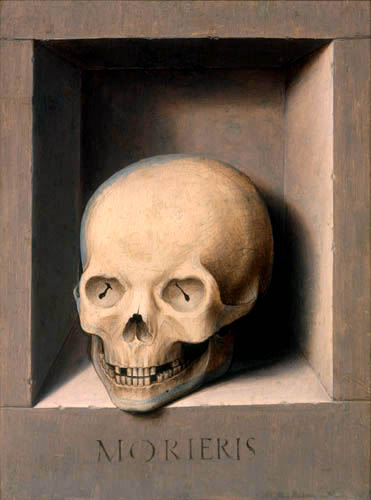
Hans Memling
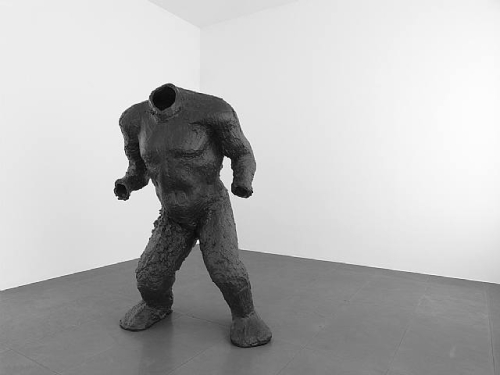
Thomas Houseago
Klein believes dependency to be a primary emotion for society, today. The infant is dependent on the breast. The Kleinian model connects the infant’s anxiety over dependence (and its triggering of aggression) with a first experience of something like *death*. Lacan and Klein both emphasize the infant’s recognition of absence…the breast is taken away. Loss and absence. Thus is born desire for what has gone missing. And need, and finally, love upon its return. Lacan though saw an additional fear; that opposite of absence, too much presence. Which, really, is about being used by this presence, and attendant loss of self determination. But love is intermixed with anxiety, for it might happen again. Truman Capote, in an early chapter of In Cold Blood, wrote of the collective anxiety and fear of that small Kansas town after the murders were made known. What if it happens again. This is why people create stories, narratives, to explain or organize these emotions. In case something happens again. And of course it always happens again. This is the motive ground for human behavior. Today, in the shadow of an official document of societal sadism, and in the outpouring of anger and grief in the aftermath of the Brown and Garner murders (and the hundred other instances of the same police lethality) there is a sense that the sickness of white America is now at its zenith. The majority of Americans, in recent polls, “approve” of torture *sometimes*. Class society enforces humiliation. One can start to feel the odd echos of the infant’s trauma in almost all details of social structure. Every single breath a servant takes he or she must control their own rage at the humiliation. For black communities under the boot heal of an inhuman and brutal occupying army — the police, and imagine the constant state of anxiety and rage. The embargo is lifted on Cuba, just in time for U.S. corporate vultures to sit waiting to pounce. Everywhere the United States has gone, only suffering follows. What is the character formation for such a people? One of the reasons that I believe art and culture matter is that without a serious expression of those things buried in us, our motives, our dream life, there is only the default setting of advertising and propaganda. Manipulation. The impulse to create is one of both making connections, metaphors, and one of discovering what cannot be seen or heard or felt. Freud saw ambition connected urethral eroticism. Abu Ghraib comes out of not just an Imperialist society of domination, it comes out of deep poison in the psyche. Ambition, guilt, rage, all the things that one must cover up. Bury. There is a reason for metaphors. To bury. Underground. Death. Every throne is a toilet seat (Norman O. Brown). The revolution is from below.
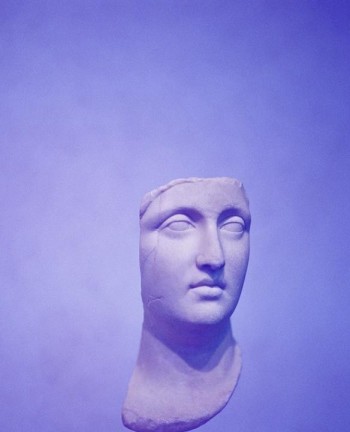
Sara Vanderbeek, photography.
It is in the collective that one becomes who one is. The individual is a toxic fiction. Art is not advertising, for advertising is there to blind and deafen. It trains the customer to *not* see, not hear. Absence need not be anxiety. But anxiety is passed on, the parents feel inadequate. My father, my mother, I cannot replace them by becoming adult. I must remain a child. The Racism found in white America is buried, and it is on the surface. It is written on faces, it is reflected in people’s eyes. It is murderous and lethal. It is experienced as a deep need, a panic, a hysteria almost. Someone has to pay for my misery. I am not deserving of this failure, this lack of success, of respect. I am special. Those people, black people, they are to blame. Everyone knows they aren’t as dependable, everyone knows they are not as clean, they are impulsive, lazy, highly sexed, sweaty.
The collective is cooperation, not competition. The problem with this is that there is no corrective. Everyone gets a blue ribbon is not a solution. Competition is serious, and not competing is flaccid and stagnant. Winners are admired. Losers must be admired, too, but not for trying, but because losing is a form of suffering and suffering brings wisdom. The loser as shaman.
Reich’s paper on The Emotional Plague was mentioned in comments here recently. I will leave off with this quote from Reich:
“The individual afflicted with the emotional plague is not content to take a passive attitude–he is distinguished from the neurotic character by a more or less life-destructive social activity. His thinking is completely muddled by irrational concepts and governed almost exclusively by irrational emotions. In the neurotic character, thinking and acting do not coincide. This is not true of the plague-afflicted character. As in the genital character, his thinking is in complete agreement with his actions, but there is a significant difference, i.e., his conclusions are not the result of his thinking. They are always predetermined by his emotional affliction. In the person afflicted with the emotional plague, thinking does not, as in the rational individual, serve to help him arrive at a correct conclusion; on the contrary, it serves to confirm and rationalize a predetermined irrational conclusion. This is generally known as “prejudice,” but one fails to see that this prejudice has detrimental social effects on a large scale. It is universally disseminated and characterizes just about everything that is called “tradition.” It is intolerant, i.e., it does not countenance the rational thinking which could pull the ground out from under it. Hence, plague-afflicted thinking is not accessible to arguments. It has its own technique in its own sphere, its own “coherence,” so to speak, which impresses one as “logical.” In this way, it creates the impression of rationality, without in reality being rational.”

Speak Your Mind